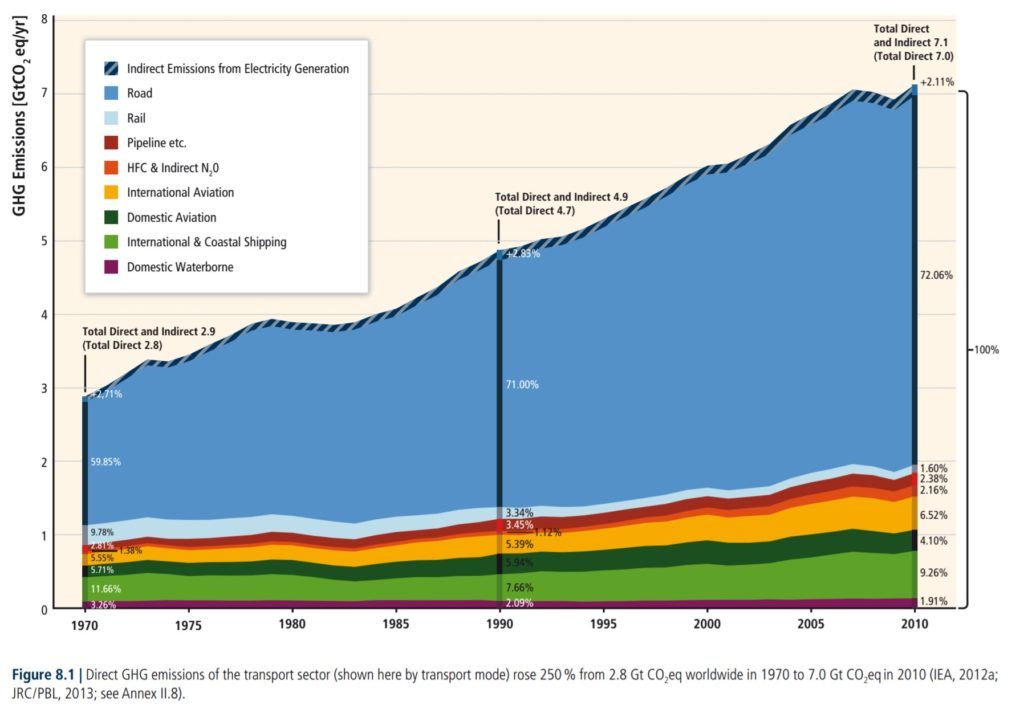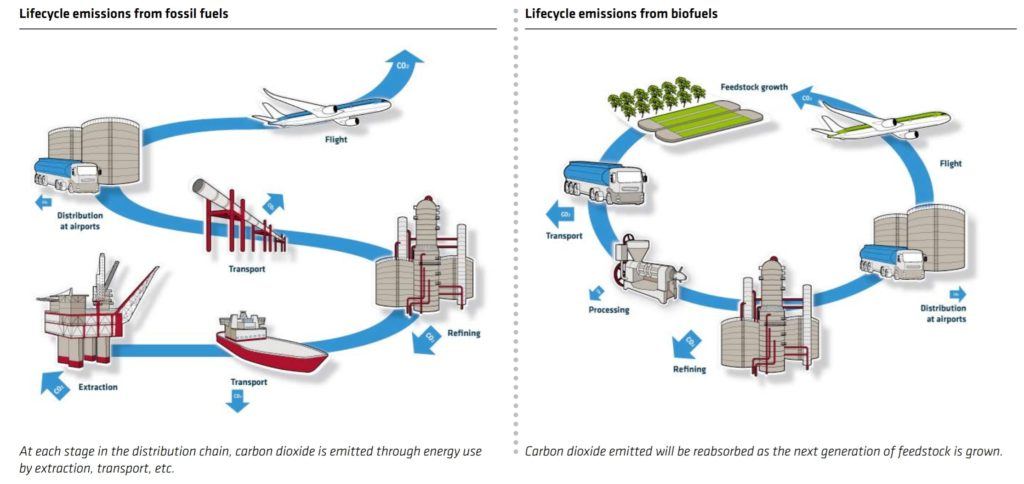Will Sustainable Biofuel Power the Airplanes of the Future?

In the pursuit to reduce greenhouse gases (GHG) emissions, we developed efficient airplanes that use less fuel. Technology improved aerodynamics, enhanced engine performance and reduced planes’ weight. But we are still using the same fossil fuel we used since the inception of aviation. Can we change that?
In this short blog, we will explore how Boeing’s strategy is affected by global warming, and the possible long-term opportunity in biofuel.
Environmental Impact of Aviation
Transportation is one of the main economic sectors contributing to global warming. Per the Intergovernmental Panel on Climate Change (IPCC) 2014[i], 14.3% of the total worldwide emissions were caused by transportation.[ii]

Transportation emissions have more than doubled since 1970 and are expected to continue to grow, with more than 10% of total transportation emissions caused by domestic and international aviation.
As other transportation sectors progress towards sustainable energy and operations and expected to reduce emissions (for example, the automotive industry focuses on shared rides and electric cars), the portion of aviation emissions is expected to grow. Moreover, the demand for commercial aviation is only expected to increase. In fact, per the International Air Transport Association (IATA), passenger demand is expected to double in the next 20 years[iii]. Economic growth, increasing worldwide urbanization and the emergence of global businesses all contribute to the increase in demand, and highlight the importance of reducing GHG emissions caused by aviation.
Boeing and the Motivation to Reduce Emissions
Boeing, founded in 1916, has delivered more than 17,000 commercial airplanes to hundreds of airline companies around the world.[iv] In 2015, the company manufactured and delivered 762 commercial airplanes[v], more than any other company in the world, including its main competitor Airbus[vi].
Many factors contribute to Boeing’s motivation to reduce emissions:
- Rules and regulations limiting carbon emissions. The Kyoto Protocol, which was adopted by the UN in 1997 provided incentives for limiting GHG emissions. Though the protocol did not limit emissions from international aviation, the international effort to reduce emissions by legislation continues. On February 2016, the International Civil Aviation Organization of the UN released a draft rule of a new emission standard for commercial aviation, aiming to reduce emissions by 4% by 2024.[vii]
- Economic upside. Airplanes with better fuel efficiency are not only environmental friendly, they also consume less fuel and therefore have improved flight range and lower operational costs. These strong upsides can affect airliners’ decisions when ordering new airplanes.
- Competition and public opinion. Public awareness for global warming is very high, with consumers’ decisions driven by how “environmentally friendly” products and services are. With Airbus’s own green initiatives[viii], Boeing cannot stay behind.
Improving Efficiency
Boeing had put heavy emphasis on environmental issues, as detailed in the company’s 2016 environmental report.[ix]
Most effective steps thus far focused on efficient aircraft design: composite materials that reduce weight; improved aerodynamic design; and new turbo-fan engines with improved fuel efficiency. Using these methods, Boeing introduced the 787-Dreamliner in 2009, which reduced fuel consumption by up to 20% compared with the 767. However, design improvement has its limits – and the use of fossil fuels in the industry is still the only option. Or is it?
The Case for Biofuel
Biofuels derive from biomass material such as plants and waste. They offer large savings in CO2 emissions because as plants that are the source for biofuel grow, they absorb CO2. That way, in a life-cycle of biofuel, the total carbon footprint can be drastically reduced, as shown in the next illustration.

Biofuel has proven feasibility as fossil fuel replacement, as opposed to other alternatives such as solar or electric power. It does not require extreme changes in current airplane design. Approved biofuel performs as well as traditional fuel, with some advantages such as higher energy content and lower freezing point. Since 2008, successful test flights have been conducted with fuel mixes comprised of up to 20% biofuel. Regulatory issues have also progressed, with ASTM approval for usage of biofuel in commercial flights[xi].
Boeing promotes many activities to commercialize biofuel in the near future: research and development of sustainable feedstock, expanding global biofuel supply, advocating for policies and regulations, reducing production costs and more. Progress has been significant.
Long-term, I believe the company should focus on a combined approach of airplane design and biofuel. Shifting to planes that run on 100% biofuel requires additional technological leap, with substantial R&D investment. But this move will be an important step towards truly sustainable and green commercial aviation.
(756 words)
[i] IPCC Climate Change 2014: Mitigation of Climate Change Chapter 8: Transport https://www.ipcc.ch/pdf/assessment-report/ar5/wg3/ipcc_wg3_ar5_chapter8.pdf
[ii] Intergovernmental Panel on Climate Change, 2014, summary for policymakers https://www.ipcc.ch/pdf/assessment-report/ar5/wg3/ipcc_wg3_ar5_summary-for-policymakers.pdf
[iii] International Air Transport Association, http://www.iata.org/pressroom/pr/Pages/2015-11-26-01.aspx
[iv] Boeing: Customers http://www.boeing.com/commercial/customers/
[v] Boeing: Boeing Achieves Record Commercial Airplane Deliveries, 2015. http://boeing.mediaroom.com/2016-01-07-Boeing-Achieves-Record-Commercial-Airplanes-Deliveries-in-2015
[vi] Airbus: Airbus exceeds targets in 2015. http://www.airbus.com/presscentre/pressreleases/press-release-detail/detail/airbus-exceeds-targets-in-2015-delivers-the-most-aircraft-ever/
[vii] Scientific American: U.N. Agency Proposes Greenhouse Gas Standard for Aircraft https://www.scientificamerican.com/article/u-n-agency-proposes-greenhouse-gas-standard-for-aircraft/
[viii] Airbus: Eco-Efficiency http://www.airbus.com/company/eco-efficiency/
[ix] Boeing: 2016 Environmental Report http://www.boeing.com/resources/boeingdotcom/principles/environment/pdf/2016_environment_report.pdf
[x] Air Transport Action Group: Sustainable Aviation Biofuels http://www.atag.org/our-activities/sustainable-aviation-biofuels.html
[xi] ASTM: Aviation Fuel Standard Now Specifies Bioderived Components http://www.astmnewsroom.org/default.aspx?pageid=2524



I think this post sparks an interesting debate as the airline industry is less in the limelight compared to other transportation sources (e.g., cars, buses, etc.) regarding sustainability. As such, I think it is important to consider the impact of biofuel in the airline industry. However, currently only mixes of up to 20% biofuel have proven successful. Is 100% biofuel even possible and how far into the future will this occur? I wonder if time would be better spend in R&D looking at different energy sources (outside of solar and electrical).
Moreover, I wonder how much of the responsibility for innovating in this industry stems from plane manufacturers and how much from airline operators. Even if Boeing comes up with a design that allows for 100% biofuels, the entire airline industry would need to adapt to this change, including Airbus, which makes me think this is an innovation further down the line.
Great article!
To respond to Kelly’s comment I would like to add that indeed so far only a 20% biofuel – kerosene blend has been proven. However, ongoing research is pushing that number upwards. On your second point, innovation in this sector is driven by the airframe manufacturers, engine makers, component makers and even material scientists. It is a highly competitive industry where only marginal advantages in fuel efficiency (and therefore lower emissions) can make big differences for the airline. Ultimately the airlines will buy from whichever supplier provides the highest fuel efficiency.
With current low oil prices the pressure on fuel efficiency has slightly decreased but long-term there is no question of its importance with fuel making up more than a quarter of airline’s operating expenses.
As for biofuel, however, it is critical that it will come at a price that matches fossil fuels. Here it is also up to the regulators to step in and potentially introduce a carbon tax on airlines to encourage use of biofuels.
Hey all! Great post and comments. As mentioned, several airlines have run trials into biofuel. My firm did a project on this topic for an airline in the Americas, and in the end the airline has not pursued it yet because there are a lot of concerns with consistent availability (the supply chain is very weak). One thing that was considered was vertical integration (buying a biofuel producer). Do you have any views on this front? Do you think there is any value the airlines integrating vertically? Is there an opportunity for Boeing to develop a supplier that can guarantee biofuel availability? I’m curious to hear your thoughts!
In theory this seems like a great solution to a tough problem, but I wonder if there could be new consequences from shifting to biofuels? I imagine that it would take vast amounts of acreage committed to growing the plants used in the biofuels in order to have enough raw materials to supply the entire aviation industry. I grew up in an agricultural area and know that when yields are a concern there is a lot of pressure to use fertilizers and pesticides to enhance those yields, which have their own negative impact on the ecosystem. While aiming to design planes that can run 100% on biofuels would be a huge success, I think equal focus (likely from Boeing’s providers vs. the company itself) needs to be put on how those biofuels can be produced en masse without introducing additional issues.
Great read, and very relevant given the latest ICAO decision last month (CORSIA). Also, the EPA just came out in July essentially laying the foundation for significant restrictions on airline emissions in the next few years. I’d assume domestically we are looking at falling in line w/ the Trend of the Paris Treaty and holding emissions to below 2020 levels conservatively. If with the election we maintain a blue white house, I’d assume a more aggressive stance by the EPA. Ultimately, I’m dubious of biofuels as per your points they aren’t there yet, require heavy capital investment, and have 2nd and 3rd order ramifications on the environment. (e.g., depleting farmland of nutrients and impacting the cost of food around the world). I think there is still a substantial amount of runway to be covered in terms of new materials to bring down the weight of airframes, including in the cabin. There is a huge opportunity in air routes, holding patterns, take off, and landings are inefficient. One opportunity is electronically assisted take-off, this is when the plane burns the most fuel and is an area where alternative technology already exists.
Great post and an interesting read! Definitely agree that airplane design will reach its limits in regard to its benefit in reducing GHG emissions, and that more radical and innovative technology applied to the industry could provide long-term sustainability. I think biofuels are definitely one way that airlines could achieve this. It’s also interesting to see how learnings from the automobile market are now being transferred and investigated for application the the aviation industry as well.
The auto industry responded to higher costs of transportation and global warming with a greater investment in building out electric and hybrid models. This technology is also now being explored in airplanes, with both NASA and Airbus exploring electric and hybrid airplanes. I agree that the airline industry is ripe for change given how much oil it currently consumes, so I hope that both biofuels and more innovative engines gain considerable traction in the market and revolutionize the aviation industry.
These technologies will require considerable R&D investment up-front, but hopefully could drive drastic changes to the industry longer-term if there were an increased focus on developing them.